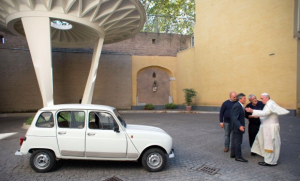Yesterday President Obama, in the context of a joint press appearance with David Cameron, talked about ways to fight the rise of extreme Islamists who carry out the kinds of attacks experienced last week in Paris. He pointed to the importance of the Muslim population integrating into U.S. society:
There is, you know, this incredible process of immigration and assimilation that is part of our tradition that is probably our greatest strength. Now, it doesn’t mean we aren’t subject to the kinds of tragedies that we saw at the Boston Marathon. But that, I think, has been helpful. There are parts of Europe in which that’s not the case.
Providing all residents – citizens and immigrants – the same opportunities for education, employment, and free exercise of their chosen religion is clearly one way to lessen the likelihood of frustration, hopelessness, and anger, feelings which provide a fertile ground for the growth of extremist views. This does not equate with immigrant or minority groups giving up their cultures (including language) and becoming indistinguishable from the majority culture. When groups such as “Pegida” in Germany (“Patriotic Europeans against the islamification of the West”) rail against the threat to Judeo-Christian culture represented by Islamic immigrants, what they are advocating for is religious intolerance, just what fuels the flames of extremist elements.
It’s not just in the West that lived experiences lead to the growth of extremism. In her new book on Afghanistan, Thieves Of State: Why Corruption Threatens Global Security, Sarah Chayes describes how the wide-spread practice of bribes and graft create strong feelings of injustice, powerlessness and rage, leading to the embrace of violent means to create a new social order. In an interview on NPR, she cited a number of examples of the humiliation Afghans experience through being extorted for bribes for all kinds of daily interactions (such as using the post office) and how contemptuously people are often treated by officials. This has understandable consequences:
It infuriates people. So first of all, you get people who are indignant and personally humiliated in a country like Afghanistan and a significant number of them, especially of males, are going to get violent. So if you have a violent movement that’s around and looking to recruit people, there’s a likelihood that they are going to really find people who have had an interaction like this or – or five of them or 10 of them – that are ready to get some revenge.
We’ve tried war, nation-building, and demonizing Islam as ways to fight terrorism – none has worked. The common sense – and just – approach is to provide opportunities for individuals and families to build their lives in an open and tolerant society. This is as true in Muslim countries as it is in the West.














